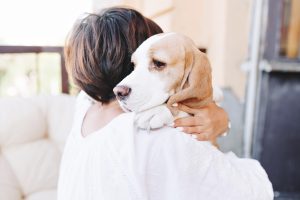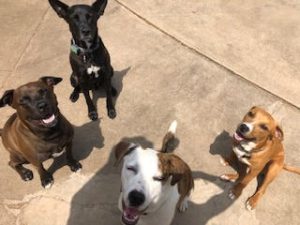Oklahoma Bar Journal
Oklahoma's Laws and Lawyers Have a Vital Role To Play in Helping Humans and Animals Impacted by Domestic Violence
By Charis L. Ward

Look! | #321145833 | stock.adobe.com
Pets, for many of us, are considered members of our family. Survivors of domestic violence and child abuse see them no differently.[1] Often, their concern for their pets and livestock and the inability to protect them and take them if they flee can keep them in abusive and highly dangerous situations.[2]
In Oklahoma in 2023, almost 50% of women and about 40% of men either had experienced or were currently experiencing domestic abuse; this makes Oklahoma the No. 1 state for the occurrence of domestic violence.[3] Furthermore, 89% of domestic violence victims with pets reported that their abuser had threatened, injured or killed family animals.[4]
Domestic violence perpetrators and child abusers manipulate, intimidate and silence their victims by routinely abusing the family’s animals or forcing the victim to do the abuse.[5] The need in Oklahoma for good laws and lawyer participation in this area is vast. This article provides an overview of the link between domestic violence and animal cruelty and several opportunities for Oklahoma’s lawyers, judges and lawmakers to help all domestic violence victims and improve our state’s ranking and reputation.
DOMESTIC VIOLENCE AND THE LINK
Domestic violence, also known as intimate partner violence (IPV) or relationship violence, “is a pattern of abusive behavior in any relationship that is used by one partner to gain or maintain power and control over another intimate partner.”[6] While a sexual relationship may be an indicator that a person is an intimate partner, it is never a necessary condition.[7] Simply stated, domestic violence is coercive behavior that influences another person within an intimate partner relationship. Domestic violence is not simply limited to physical abuse.[8] Rather, its dynamics are complex and encompass many forms of abuse, including emotional, economic, psychological, sexual, technological and animal abuse.[9] Domestic violence does not discriminate. It occurs across all ages, races, genders, education statuses, religious beliefs, socioeconomic groups and locations.[10]
There are established significant correlations between animal abuse, domestic violence, child abuse and neglect, elder abuse and other forms of violence. This species-spanning interconnectedness of different forms of violence is formally called “The Link.”[11] Here are a few common ways animal abuse is used as power and control by a perpetrator of domestic and child abuse:
- Removing or killing family animals to take away the survivor’s source of emotional support
- Forcing participation in animal sexual abuse
- Refusing to allow the survivor to spend money on the animals’ food or veterinary care
- Harming animals and saying, “Next time, it will be you.”
- Targeting animals of family/friends who aid in the survivor’s escape
- Blaming the survivor or animals for the cruelty
- Killing the animal and saying it didn’t matter because the animal was old, dying, etc.
- Threatening to harm or kill the animals if the victim leaves or asserts any independence[12]
This is particularly concerning in Oklahoma, given the percentage of the state’s population engaged in domestic violence and the effects that domestic violence has on children. Children exposed to domestic violence are three times more likely to be cruel to animals and more likely to become perpetrators of domestic abuse.[13] Studies show that 75% of domestic animal abuse occurs in front of children.[14]
Oklahomans and Oklahoma’s animals need laws and lawyers to facilitate safe shelter for both human and animal victims of domestic violence. Possible roles and methods are explored more in the following sections.
INCLUDE ANIMALS IN A VICTIM PROTECTIVE ORDER (VPO)
Oklahoma’s laws allow the protection of pets and livestock in a victim protective order (VPO).[15] Title 22 O.S. Section 60.2 (E) provides, “The person seeking a protective order may further request the exclusive care, possession, or control of any animal owned, possessed, leased, kept, or held by either the petitioner, defendant or minor child residing in the residence of the petitioner or defendant. The court may order the defendant to make no contact with the animal and forbid the defendant from taking, transferring, encumbering, concealing, molesting, attacking, striking, threatening, harming, or otherwise disposing of the animal.”[16]
Survivors of domestic abuse need lawyers to help them with VPO paperwork and hearings, as the process can be fast-paced, confusing and uncomfortable. Obtaining such protection hinges on meeting statutory requirements and providing clear pleadings and evidentiary proof, all while the survivor remains exposed to the trauma of the abuse and confronts the abuser in court. Although these proceedings can be handled pro se, survivors of domestic violence can feel far more empowered to take this next step to protect themselves when they have the benefit of legal counsel.[17]
JUDICIAL RECOGNITION THAT ANIMAL CRUELTY CAN BE DOMESTIC VIOLENCE
A criminal animal abuse case out of the Washington Supreme Court gained positive national attention in 2022 when it unanimously held that animal cruelty can constitute domestic violence. This judicial recognition is important, as it underscores the importance of the law recognizing the established link between animal abuse and domestic violence. When animal cruelty occurs as part of an intimate relationship to exert power and control, it is also domestic violence.[18]
In State v. Abdi-Issa,[19] Charmarke Abdi-Issa was convicted of animal cruelty for viciously beating his girlfriend’s dog, Mona, in a Seattle parking lot. The lethal attack was brutal, intentional and part of a long pattern of using the dog to exercise power and control over his girlfriend, Ms. Fairbanks. The state charged Mr. Abdi-Issa with animal cruelty in the first degree and sought a domestic violence designation because, in Washington, such designation affords additional protections for domestic violence victims at the time of sentencing.
On appeal, Mr. Abdi-Issa challenged the domestic violence designation, arguing that because his crime was against an animal and not a person, the domestic violence designation was improper. The Washington Court of Appeals noted the definition of “domestic violence” includes an inexhaustive list of crimes committed by “one family or household member against another family or household member” and held that “Abdi-Issa committed the crime of animal cruelty against Mona, not Fairbanks.” Because “Mona was not a ‘person,’” she could not qualify as a “family or household member.” The Court of Appeals vacated the domestic violence designation.
The Washington Supreme Court granted review to determine “whether animal cruelty may be designated a crime of domestic violence” and unanimously disagreed with the Court of Appeals, noting, “Animals are legally considered property and domestic violence can involve property crimes, such as burglary and malicious mischief. Here, ‘Fairbanks was directly harmed as a result of Abdi-Issa’s violent killing of her beloved pet and companion. She is plainly a victim of Abdi-Issa’s crime.’”
Washington’s statutes define “victim” as “any person who has sustained emotional, psychological, physical, or financial injury to person or property as a direct result of the crime charged.”[20] The Washington Supreme Court held that this definition encompassed Ms. Fairbanks, as her “testimony suggests psychological abuse, which was a part of a larger pattern of assaultive, coercive, and controlling behavior, occurred.”
Neither the Oklahoma courts nor the Legislature have specifically addressed the issue of whether animal cruelty could be a crime of domestic violence. However, the Oklahoma Legislature appears to recognize the link between domestic violence and animal cruelty in its inclusion of them in VPOs.[21] It appears reasonable, even possible, that Oklahoma could also judicially recognize that a person can be a victim of a crime of domestic violence if their pet/livestock is subjected to acts of animal cruelty to cause the person harm.

Author Charis L. Ward's pups: from left Gidget, Astro, Scooter and Josh
PROVIDE LEGAL SERVICES TO CREATE AND AID FOSTER PROGRAMS AND SHELTER OPPORTUNITIES
As discussed earlier, the need for safe places for victims of domestic violence with pets is great, but where are they to go? Only a small number of domestic violence shelters currently provide shelter for animals, and they are usually always at or beyond capacity. For example, in 2023, the Animal Advocacy Program (AAP) (a partnership between Palomar: Oklahoma City’s Family Justice Center and the Oklahoma Humane Society) served 362 people and 843 animals in Oklahoma City. Last year, with the aid of AAP, 89 animals were fostered, 53 animals were surrendered, and there were 555 pet pantry visits. What about those who are located elsewhere in the state and who have waited for or are still waiting for a safe place to escape?
Animal rescues and foster programs can help fill the void, and legal services are vital for their success. Unlike traditional rescue and foster programs, where the nonprofit legally owns the animals in their care, domestic abuse victims usually need only temporary care while they work to secure a safe place for themselves and their animals.
Lawyers can help these organizations minimize liabilities by making sure they are properly formed legal entities and have the necessary internal legal structure and paperwork. Preparing and filing proper entity creation documents and drafting temporary shelter agreements, waivers and liability releases, consent forms, foster forms, privacy/nondisclosure agreements, best practice frameworks and more can be a tremendous aid in getting more temporary foster and shelter programs in place.[22] In addition, lawyers can educate local city officials, hospitals and service organizations to help establish relationships of support and synergy with these temporary housing programs.
Lawyers can also help shelters navigate various grant program requirements.[23] The Pets and Women Safety Act (PAWS) of 2017 was signed as part of the 2018 Farm Bill. This federal legislation is expanding the availability of co-shelter options. PAWS’ purpose is “[t]o protect victims of domestic violence, sexual assault, stalking, and dating violence from emotional and psychological trauma caused by acts of violence or threats of violence against their pets.”[24] It directs the U.S. Department of Agriculture to award grants for shelter, housing assistance and support services to domestic violence victims with pets.
By providing these services, lawyers can help create and grow programs that establish a network of temporary foster parents who can provide safe homes for animals, thus allowing human survivors to focus on their needs until they can find a safe place to bring their entire family back together away from their abuser.
PROVIDE OTHER CIVIL LEGAL SERVICES
If you don’t have a place to live, you don’t have a place for your pet. Lawyers can help survivors obtain temporary and permanent safe housing for both human and animal survivors of domestic violence by negotiating and drafting solid lease agreements with proper pet addendums. More than 65% of households have pets, yet many landlords in the state elect not to rent to individuals with pets. Such decisions reduce their applicant pool, consequently increasing the need for subsequent legal counsel when a tenant, nevertheless, houses a pet on the property. Many landlords are unaware of the obligations and responsibilities they have to not discriminate and to provide reasonable accommodations under the Fair Housing Act and the Americans with Disabilities Act. Both landlords and tenants would greatly benefit from the guidance of legal counsel.
In Oklahoma City, the Palomar Legal Network provides opportunities for attorneys to volunteer their services or offer them at a reduced rate to help survivors secure housing and obtain other civil legal services.[25] Free victim protection order trainings are offered to attorneys desiring to help.[26] Additionally, in 2024, there will be four opportunities for attorneys to volunteer to provide limited legal advice on issues such as VPOs, family and domestic matters and landlord and tenant issues.[27] Look for groups in your area of the state that provide such opportunities or help get them started.
CONCLUSION
Whether it’s utilizing Oklahoma’s laws to provide the maximum protection to human and nonhuman survivors of domestic violence or educating ourselves as lawyers so that we can best counsel our clients, lawyers play a vital role in facilitating refuge for all victims impacted by domestic violence.
If you are a victim of domestic violence and need immediate assistance, call the National Domestic Violence Hotline at 1-800-799-7233.
EDUCATE YOURSELF ON OKLAHOMA LAWS AND BUILD A LIBRARY OF RESOURCES
Based upon the staggering statistics, it is extremely likely that you know someone experiencing domestic violence and animal abuse, though they may not have directly revealed such to you. Do you know how to report suspected abuse? Are you aware of local and nonlocal resources of aid? Here are a few ways you can educate yourself and your law practice and a few resources for you to bookmark.
- Join the OBA’s Animal Law Section (and other states’ animal law sections)
- Join the American Bar Association’s Animal Law Committee
- Attend the 32nd annual Animal Law Conference in Portland, Oregon, on Oct. 11-13, www.animallawconference.org
Books and Bookmarks
- Guide to Representing Animal Protection Organizations, Daina Bray and Yolanda Eisenstein, published by the American Bar Association, Business Law Section
- https://saavprogram.org: an in-depth resource guide for starting a shelter program for the pets of domestic abuse victims, including sample forms
- https://bit.ly/3SKspvz: This webpage has information on reporting abuse for all 77 counties in Oklahoma, as well as links to resources in other states.
- https://redrover.org/relief-dv: The RedRover Relief Safe Escape grant program helps families with pets safely escape domestic violence together. Funding is mainly provided to help with the cost of temporary pet boarding while a client is in a domestic violence shelter.
- domesticshelters.org: This website locates domestic shelters that offer a pet program. See if there are any in your area.
- safehavensforpets.org: This website locates animal organizations that provide boarding or fostering for pets, as well as domestic violence shelters that offer a pet program.
- https://palomarokc.org/animal-advocacy-program: The Oklahoma Humane Society and Palomar have partnered to create the Animal Advocacy Program to help domestic violence victims who are fleeing and have pets.
 ABOUT THE AUTHOR
ABOUT THE AUTHOR
Charis L. Ward is an Oklahoma attorney who focuses on animal and real property law. She is the current vice chair of the OBA Animal Law Section and a member of the OBA Real Property Law Section and Title Examination Standards Committee, the ABA Animal Law Committee and Companion Animals Subcommittee and the Oklahoma City Real Property Lawyers Association. She and her husband are the proud “paw”rents of three purebred mutts: Gidget, Astro and Josh, aka Mr. Wigglesworth.
ENDNOTES
[1] “Pet Ownership Statistics 2024,” https://bit.ly/49phHQu.
[2] “Domestic Violence and The Link,” National Link Coalition, https://bit.ly/49opePD.
[3] See World Population Review’s study “Domestic Violence by State 2024,” https://bit.ly/3SB72Ma.
[4] Palomar/Oklahoma Humane Society Animal Advocacy Program, https://bit.ly/488ToWe.
[5] “Domestic Violence and The Link,” National Link Coalition, https://bit.ly/49opePD.
[6] “What is Domestic Violence,” Office on Violence Against Women, U.S. Department of Justice, www.justice.gov/ovw/domestic-violence.
[7] Oklahoma Statutes Title 60. O.S. §60.1(6)(D) – Definitions – Intimate Partner.
[8] “What is Domestic Violence,” Office on Violence Against Women, U.S. Department of Justice, www.justice.gov/ovw/domestic-violence.
[9] Id.
[10] https://bit.ly/3HOzl4I.
[11] https://nationallinkcoalition.org.
[12] “The ‘Power and Control Wheel’ of Domestic Abuse and Animal Violence,” https://bit.ly/3SKhsu2.
[13] “Animal cruelty by children exposed to domestic violence,” Child Abuse & Neglect, Volume: 30, Issue: 4, Dated: April 2006, Pages: 425-435, Cheryl L. Currie.
[14] “Domestic violence and animal abuse have significant impacts on children,” https://bit.ly/49opePD.
[15] Oklahoma Statutes Title 22 Section 60.2 – Protective Order – Petition – Form – Filing Fee – Preparation – Protection of Animal.
[16] Id.
[17] Megan A. Senatori and Allison Palmbach, “Lawyers Can Play a Vital Role in Facilitating Refuge for Humans and Animals Impacted by Domestic Violence,” American Bar Association Tort Trial and Insurance Practice Section Animal Law Committee Newsletter, Winter/Spring 2023.
[18] Megan A. Senatori, “More Than a Link: Animal Cruelty is Domestic Violence,” Lewis & Clark Law School, Center for Animal Law Studies (March 3, 2022), https://bit.ly/49f2gdQ.
[19] 504 P.3d 223 (Wash. 2022) No. 99581-8, 2022 WL 481421 (Wash. Feb. 17, 2022).
[20] Id. (Emphasis added).
[21] 22 O.S. §60.2 E.
[22] See “Guide to Representing Animal Protection Organization,” Daina Bray and Yolanda Eisenstein, published by the American Bar Association, Business Law Section.
[23] Megan A. Senatori and Allison Palmbach, “Lawyers Can Play a Vital Role in Facilitating Refuge for Humans and Animals Impacted by Domestic Violence,” American Bar Association Tort Trial and Insurance Practice Section Animal Law Committee Newsletter, Winter/Spring 2023.
[24] “Pet and Women Safety (PAWS) Act,” Animal Welfare Institute, https://bit.ly/3uvXIkn, Pet & Women Safety Act of 2017, H.R. 909 – 115th CONG. §3 (2019).
[25] Palomar: Oklahoma City’s Family Justice Center. https://palomarokc.org/legal-resources. For more information, contact kelly.masters.newton@palomarokc.org.
[26] Id.
[27] Id. Feb. 16, May 17, Aug. 16, Nov. 15. For more information, contact kelly.masters.newton@palomarokc.org.
Originally published in the Oklahoma Bar Journal – OBJ 95 No. 3 (March 2024)
Statements or opinions expressed in the Oklahoma Bar Journal are those of the authors and do not necessarily reflect those of the Oklahoma Bar Association, its officers, Board of Governors, Board of Editors or staff.
